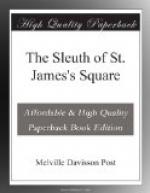My father turned about and looked at the man.
“Is your name Gosford?” he said in his cold, level voice.
“It is, sir,” replied the Englishman, " — Anthony Gosford.”
“Well, Mr. Anthony Gosford,” replied my father, “kindly close the door that you have opened.”
Lewis plucked out his snuffbox and trumpeted in his many-colored handkerchief to hide his laughter.
The Englishman, thrown off his patronizing manner, hesitated, closed the door as he was bidden — and could not regain his fine air.
“Now, Mr. Gosford,” my father went on, “why was this room violated as we see it?”
“It was searched for Peyton Marshall’s will, sir,” replied the man.
“How did you know that Marshall had a will?” said my father.
“I saw him write it,” returned the Englishman, “here in this very room, on the eighteenth day of October, 1854.”
“That was two years ago,” said my father. “Was the will here at Marshall’s death?”
“It was. He told me on his deathbed.”
“And it is gone now?”
“It is,” replied the Englishman.
“And now, Mr. Gosford,” said my father, “how do you know this will is gone unless you also know precisely where it was?”
“I do know precisely where it was, sir,” returned the man. “It was in the row of drawers on the right of the window where you stand — the second drawer from the top. Mr. Marshall put it there when he wrote it, and he told me on his deathbed that it remained there. You can see, sir, that the drawer has been rifled.”
My father looked casually at the row of mahogany drawers rising along the end of the bookcase. The second one and the one above were open; the others below were closed.
“Mr. Gosford,” he said, “you would have some interest in this will, to know about it so precisely.”
“And so I have,” replied the man, “it left me a sum of money.”
“A large sum?”
“A very large sum, sir.”
“Mr. Anthony Gosford,” said my father, “for what purpose did Peyton Marshall bequeath you a large sum of money? You are no kin; nor was he in your debt.”
The Englishman sat down and put his fingers together with a judicial air.
“Sir,” he began, “I am not advised that the purpose of a bequest is relevant, when the bequest is direct and unencumbered by the testator with any indicatory words of trust or uses. This will bequeathes me a sum of money. I am not required by any provision of the law to show the reasons moving the testator. Doubtless, Mr. Peyton Marshall had reasons which he deemed excellent for this course, but they are, sir, entombed in the grave with him.”
My father looked steadily at the man, but he did not seem to consider his explanation, nor to go any further on that line.
“Is there another who would know about this will?” he said.
“This effeminate son would know,” replied Gosford, a sneer in the epithet, “but no other. Marshall wrote the testament in his own hand, without witnesses, as he had the legal right to do under the laws of Virginia. The lawyer,” he added, “Mr. Lewis, will confirm me in the legality of that.”




